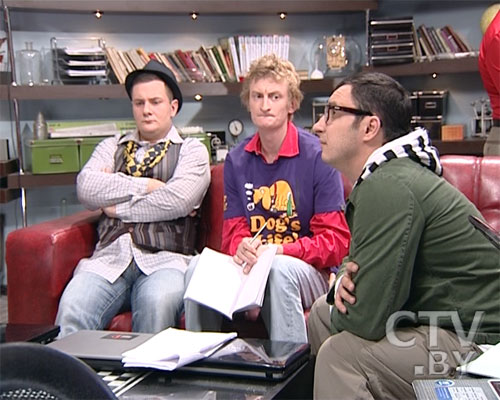The Big Bang Theory, in Theory
In the fall of 2007, CBS debuted “The Big Bang Theory,” a sitcom centered around the intelligence and social awkwardness of a group of super-smart young PhDs. The show was a success out of the gate, averaging eight million viewers per episode in its first season. From there, it only gained steam — by its sixth season, was one of the top five shows in the U.S. (by rating), drawing nearly twenty million viewers per episode. And the show’s popularity spread far and wide — even to Belarus.

In the beginning of 2010, the Belarusian television channel CTV began broadcasting a TV show titled “Теоретики” or, in English, “The Theorists,” which, as seen above (via the show’s official website), was designed to look just like “The Big Bang Theory.” It had similar plots, similar looking actors, similarly-placed laughter, etc. — in fact, each episode of “The Theorist” was, roughly, a translated version of a “The Big Bang Theory” episode. (If you really want to watch an episode, you can, here.) It’s fair to call the show a copy of the original, which isn’t all that uncommon — British shows like “The Office” have been adapted for U.S. audiences, and there are plenty of similar examples. The problem with the Belarusian adaption of “The Big Bang Theory,” though, was that “The Theorists” wasn’t authorized by Warner Brothers, the production company and distributor of the original show. It was a rip-off.
And on February 8, 2010, millions of American TV watchers became aware of this. Chuck Lorre, the creator of “The Big Bang Theory,” has a tradition of putting non-sequitur messages on “vanity cards” at the end of the show. He used a vanity card at the end of that evening’s episodes to share the news his discovery of about the Belarusian version of his hit show. The full message can be seen here, but it did more than just alert America about the odd and unauthorized tribute. As Lorre wrote, “When we brought this to the attention of the Warner Brothers legal department, we were told that it’s next to impossible to sue for copyright infringement in Belarus because the TV production company that is ripping us off is owned and operated by the government of Belarus. Having no other recourse, I’m hoping that this vanity card will be read by the fine folks making The Theorists, and, wracked with guilt, they break down and send us some felt hats.”
Seems like a long shot? Yep. But amazingly, it worked. While the production company behind “The Theorists” didn’t care about Lorre’s objection, another key group did. A few days after the vanity card hit, Belarusian news agency Charter 97 reported (in Russian) that the actors in “The Theorists” weren’t aware of the dodgy legal status of their show and, having learned the truth, no longer wanted to be part of the production. On February 18, 2010, Charter 97 announced that the show was being cancelled.
 Bonus Fact: There was one major difference between “The Big Bang Theory” and “The Theorists” — beyond the language difference, that is. “The Theorists” used a laugh track but, despite rumors and accusations that “the Big Bang Theory” did the same, Lorre claimed otherwise — via another of his vanity cards (seen here). The “laugh machine” the show used was, as seen on the vanity card, the live studio audience.
Bonus Fact: There was one major difference between “The Big Bang Theory” and “The Theorists” — beyond the language difference, that is. “The Theorists” used a laugh track but, despite rumors and accusations that “the Big Bang Theory” did the same, Lorre claimed otherwise — via another of his vanity cards (seen here). The “laugh machine” the show used was, as seen on the vanity card, the live studio audience.
From the Archives: De Grote Donorshow: Another controversial TV show.
Related: The first season of The Big Bang Theory. (In case you prefer the English version to the Belarusian one.)
